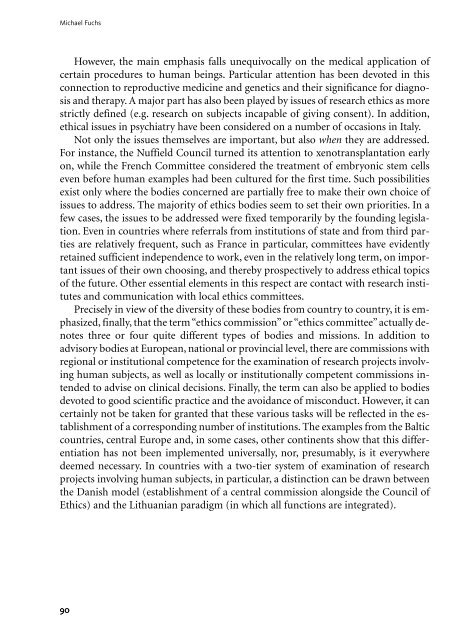Michael Fuchs National ethics councils - Deutscher Ethikrat
Michael Fuchs National ethics councils - Deutscher Ethikrat
Michael Fuchs National ethics councils - Deutscher Ethikrat
You also want an ePaper? Increase the reach of your titles
YUMPU automatically turns print PDFs into web optimized ePapers that Google loves.
<strong>Michael</strong> <strong>Fuchs</strong> <strong>National</strong> <strong>ethics</strong> <strong>councils</strong>. Their backgrounds, functions and modes of operation compared<br />
However, the main emphasis falls unequivocally on the medical application of<br />
certain procedures to human beings. Particular attention has been devoted in this<br />
connection to reproductive medicine and genetics and their significance for diagnosis<br />
and therapy. A major part has also been played by issues of research <strong>ethics</strong> as more<br />
strictly defined (e.g. research on subjects incapable of giving consent). In addition,<br />
ethical issues in psychiatry have been considered on a number of occasions in Italy.<br />
Not only the issues themselves are important, but also when they are addressed.<br />
For instance, the Nuffield Council turned its attention to xenotransplantation early<br />
on, while the French Committee considered the treatment of embryonic stem cells<br />
even before human examples had been cultured for the first time. Such possibilities<br />
exist only where the bodies concerned are partially free to make their own choice of<br />
issues to address. The majority of <strong>ethics</strong> bodies seem to set their own priorities. In a<br />
few cases, the issues to be addressed were fixed temporarily by the founding legislation.<br />
Even in countries where referrals from institutions of state and from third parties<br />
are relatively frequent, such as France in particular, committees have evidently<br />
retained sufficient independence to work, even in the relatively long term, on important<br />
issues of their own choosing, and thereby prospectively to address ethical topics<br />
of the future. Other essential elements in this respect are contact with research institutes<br />
and communication with local <strong>ethics</strong> committees.<br />
Precisely in view of the diversity of these bodies from country to country, it is emphasized,<br />
finally, that the term “<strong>ethics</strong> commission” or “<strong>ethics</strong> committee” actually denotes<br />
three or four quite different types of bodies and missions. In addition to<br />
advisory bodies at European, national or provincial level, there are commissions with<br />
regional or institutional competence for the examination of research projects involving<br />
human subjects, as well as locally or institutionally competent commissions intended<br />
to advise on clinical decisions. Finally, the term can also be applied to bodies<br />
devoted to good scientific practice and the avoidance of misconduct. However, it can<br />
certainly not be taken for granted that these various tasks will be reflected in the establishment<br />
of a corresponding number of institutions. The examples from the Baltic<br />
countries, central Europe and, in some cases, other continents show that this differentiation<br />
has not been implemented universally, nor, presumably, is it everywhere<br />
deemed necessary. In countries with a two-tier system of examination of research<br />
projects involving human subjects, in particular, a distinction can be drawn between<br />
the Danish model (establishment of a central commission alongside the Council of<br />
Ethics) and the Lithuanian paradigm (in which all functions are integrated).<br />
90<br />
5. Right of referral<br />
Although nearly all the founding instruments specifically mention the institutions of<br />
state as enjoying the right of referral, a liberal approach to access to <strong>ethics</strong> bodies<br />
seems to be the rule internationally. In this respect, the ad hoc commissions are<br />
sharply distinguished from the permanent bodies discussed here. However, a wide<br />
variety of tendencies are observed in referral practice. Overall, referrals by governments<br />
and ministries appear to predominate, but this situation may be offset in some<br />
countries by large numbers of minor referrals from individual research workers or<br />
members of the public – although minor referrals of this kind do not give rise to<br />
large-scale reports and fundamental analyses.<br />
6. Advisory mandate<br />
None of the bodies described here as paradigms has legally binding decision-making<br />
powers. In some cases, the central coordinating body for local <strong>ethics</strong> commissions<br />
operating in accordance with the Helsinki Declaration constitutes a separately functioning<br />
part of the national <strong>ethics</strong> council. Where this is case, as for example in<br />
Lithuania or Slovenia, positions adopted by the national <strong>ethics</strong> body may have direct<br />
legal effects. In most cases, on the other hand, the functions of examining research<br />
projects and of general bioethical advice are clearly divided among different institutions,<br />
as in France and Denmark. A restriction to advisory and consultative activity<br />
is also often expressed in the body’s name. Depending on its mission, institutional<br />
framework and specific historical development, the proximity of an advisory body to<br />
the executive and the legislature may vary.<br />
7. Influence on legislative procedures<br />
In continental European jurisdictions at least, identification of a need for legislation<br />
appears to be a central task of national <strong>ethics</strong> committees.Yet there are institutions such<br />
as the Danish Council that are internationally regarded as successful although they<br />
have not manifestly influenced actual political decisions. Conversely, others, such as the<br />
Nuffield Council in the United Kingdom or the Italian Committee, have occasionally<br />
exerted a substantial influence. In eastern Europe, where many countries lacked specific<br />
laws on bioethical issues before the national <strong>councils</strong> were established, these bodies<br />
have sometimes even taken the initiative for the formulation of such instruments.<br />
91




